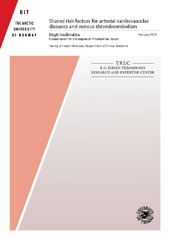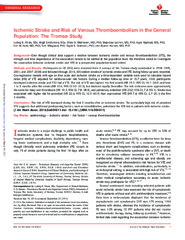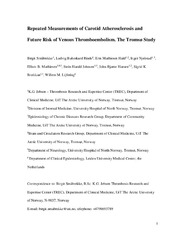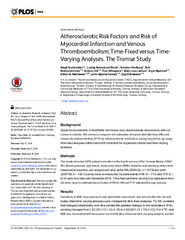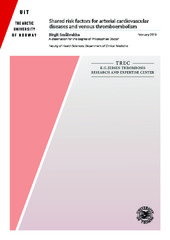| dc.contributor.advisor | Hansen, John-Bjarne | |
| dc.contributor.author | Småbrekke, Birgit | |
| dc.date.accessioned | 2019-06-20T13:03:53Z | |
| dc.date.available | 2019-06-20T13:03:53Z | |
| dc.date.issued | 2019-06-28 | |
| dc.description.abstract | <i>Summary</i> - Extensive evidence support an association between arterial cardiovascular disease (CVD, i.e. myocardial infarction [MI] and ischemic stroke), and subsequent venous thromboembolism (VTE, i.e. deep vein thrombosis [DVT]) and pulmonary emboli [PE]). However, the mechanism behind the associations remains unclear. The aim of this thesis was to investigate the impact of ischemic stroke on VTE and to investigate potential shared risk factors for arterial CVD and VTE.
All papers in this thesis utilize data from the Tromsø Study. The study populations for Paper I, II and III were recruited from the fourth, fifth and sixth survey of the Tromsø study. In Paper IV, we recruited a subgroup participants with genetic information from the fourth survey of the Tromsø Study and from the second survey of the Nord-Trøndelag Health (HUNT) Study.
Ischemic stroke was associated with a transient increased risk of VTE, and the risk was particularly high for provoked events. The association persisted after adjusting for potential confounders, indicating that the stroke itself increased the VTE risk. We found no association between formation, presence or progression of atherosclerosis and VTE in time-varying analyses, indicating that atherosclerosis does not represent the missing link for the association between arterial CVD and VTE. Except for body mass index, none of the traditional cardiovascular risk factors increased the risk of VTE, and risk estimates for MI and VTE based on a single baseline measurement and repeated measurements corresponded well. Lastly, we showed that the association between a family history of MI (FHMI) and VTE is not explained by prothrombotic genotypes.
Our findings imply a strong and transient increased risk of VTE after ischemic stroke and that the association between arterial CVD and VTE cannot be explained by atherosclerosis. Of the well-known cardiovascular risk factors, only age, obesity and FHMI are associated with VTE. The association between arterial CVD and subsequent VTE is only partly explained by shared risk factors. The remaining association is likely mediated by risk factors following the arterial cardiovascular event, such as immobilization and infection, and direct effects of the arterial cardiovascular event, such as activation of the coagulation system. | en_US |
| dc.description.abstract | <i>Sammendrag</i> - Det er gode holdepunkter for en sammenheng mellom arteriell kardiovaskulær sykdom (hjerteinfarkt og iskemisk hjerneslag) og påfølgende risiko for venøs tromboembolisme (VTE, fellesbetegnelsen på dyp venetrombose [DVT] og lungeemboli [LE]), men mekanismen for denne sammenhengen er ukjent. Formålet med denne avhandlingen har vært å undersøke hvordan hjerneslag påvirker risikoen for VTE og å undersøke potensielle felles risikofaktorer for kardiovaskulær sykdom og VTE.
Artiklene i avhandlingen bruker data fra Tromsøundersøkelsen. Studiedeltakerne i artikkel I, II og III ble rekruttert fra den fjerde, femte og sjette undersøkelsen (Tromsø 4, 5 og 6). De inkluderte i artikkel IV besto av en undergruppe som fikk utført genetiske analyser. Disse deltok i Tromsø 4 eller i den andre Helseundersøkelsen i Nord-Trøndelag (HUNT 2).
Iskemisk hjerneslag ga en forbigående økt risiko for VTE, og risikoen var særlig høy for provosert VTE. Sammenhengen vedvarte etter justering for potensielle konfoundere, noe som indikerer at det var hjerneslaget, eller tilstander relatert til hjerneslaget, som økte risikoen for VTE. Det var ingen sammenheng mellom nydannelse, tilstedeværelse eller progresjon av aterosklerose og VTE i analyser med oppdaterte målinger, noe som tyder på at aterosklerose ikke kan forklare sammenhengen mellom kardiovaskulær sykdom og VTE. Foruten kroppsmasseindeks ga ingen av de tradisjonelle kardiovaskulære risikofaktorene økt risiko for VTE, og risikoestimater for hjerteinfarkt og VTE basert på én måling og repeterte målinger korresponderte godt. Vi viste også at sammenhengen mellom familiær predisposisjon for hjerteinfarkt (FHMI) og VTE ikke kunne forklares av gener som øker trombosetendensen.
Våre funn tyder på at det er en midlertidig økt risiko for VTE etter iskemisk hjerneslag, og at assosiasjonen mellom kardiovaskulær sykdom og VTE ikke kan forklares av aterosklerose. Blant velkjente kardiovaskulære risikofaktorene var det bare alder, overvekt og FHMI som hadde sammenheng med VTE. Felles risikofaktorer kan dermed bare delvis forklare sammenhengen mellom kardiovaskulær sykdom og VTE. Resten av sammenhengen kan trolig forklares av at komplikasjoner etter den kardiovaskulære hendelsen, som for eksempel immobilisering og infeksjoner, øker risikoen for VTE, eller at den kardiovaskulære hendelsen fører til aktivering av koagulasjonssystemet og dermed økt trombosetendens. | en_US |
| dc.description.doctoraltype | ph.d. | en_US |
| dc.description.popularabstract | Extensive evidence support an association between arterial cardiovascular disease (CVD, i.e. myocardial infarction [MI] and ischemic stroke), and subsequent venous thromboembolism (VTE, i.e. deep vein thrombosis [DVT]) and pulmonary emboli [PE]). However, the mechanism behind the associations remains unclear. The aim of this thesis was to investigate the impact of ischemic stroke on VTE and to investigate potential shared risk factors for arterial CVD and VTE.
The study populations for Paper I, II and III were recruited from the fourth, fifth and sixth survey of the Tromsø study. In Paper IV, we recruited a subgroup participants with genetic information from the fourth survey of the Tromsø Study and from the second survey of the Nord-Trøndelag Health (HUNT) Study.
Ischemic stroke was associated with a transient increased risk of VTE, and provoked VTE in particular, indicating that the stroke itself increased the VTE risk. We found no association between formation, presence or progression of atherosclerosis and VTE in time-varying analyses, indicating that atherosclerosis does not represent the missing link for the association between arterial CVD and VTE. Except for body mass index, none of the traditional cardiovascular risk factors increased the risk of VTE. Lastly, we showed that the association between a family history of MI and VTE is not explained by prothrombotic genotypes.
Our findings imply a strong and transient increased risk of VTE after ischemic stroke and that the association between arterial CVD and VTE cannot be explained by atherosclerosis. Of the well-known cardiovascular risk factors, only age, obesity and FHMI are associated with VTE. The association between arterial CVD and subsequent VTE is only partly explained by shared risk factors. The remaining association is likely mediated by risk factors following the arterial event, such as immobilization and infection, and direct effects of the arterial event, such as activation of the coagulation system. | en_US |
| dc.description.sponsorship | The K.G. Jebsen - Thrombosis Research and Expertise Center (TREC) is supported by an independent grant from Stiftelsen Kristian Gerhard Jebsen. | en_US |
| dc.identifier.uri | https://hdl.handle.net/10037/15580 | |
| dc.language.iso | eng | en_US |
| dc.publisher | UiT The Arctic University of Norway | en_US |
| dc.publisher | UiT Norges arktiske universitet | en_US |
| dc.relation.haspart | <p>Paper I: Rinde, L.B., Småbrekke, B., Mathiesen, E.B., Løchen, M.L., Njølstad, I., Hald, E.M. … Hansen, J-B. (2016). Ischemic stroke and risk of venous thromboembolism in the general population: The
Tromsø study. <i>Journal of the American Heart Association, 5</i> (11): e004311. Also available in Munin: <a href=https://hdl.handle.net/10037/10165>https://hdl.handle.net/10037/10165. </a> <p>
<p>Paper II: Småbrekke, B., Rinde, L.B., Hald, E.M., Njølstad, I., Mathiesen, E.B., Johnsen, S.H. … Lijfering, W.M. (2017). Repeated measurements of carotid atherosclerosis and future risk of venous
thromboembolism: The Tromsø Study. (Manuscript). Also available in Munin: <a href=https://hdl.handle.net/10037/14764>https://hdl.handle.net/10037/14764. </a><p>
<p>Paper III: Småbrekke, B., Rinde, L.B., Hindberg, K., Hald, E.M., Vik, A., Wilsgaard, T. … Brækkan, S.K. (2016). Atherosclerotic risk factors and risk of myocardial infarction and venous
thromboembolism; time-fixed versus time-varying analyses. The Tromsø Study. <i>PLOS ONE, 11</i>(9): e0163242. Also available in Munin: <a href=https://hdl.handle.net/10037/10241>https://hdl.handle.net/10037/10241. </a><p>
<p>Paper IV: Småbrekke, B., Rinde, L.B., Evensen, L.H., Morelli, V.M., Hveem, K., Gabrielsen, M.E. … Hansen, J.B. (2019). Impact of prothrombotic genotypes on the association between family history of
myocardial infarction and venous thromboembolism. (Manuscript). The paper is available in the file "thesis_entire.pdf". Published version in <i>Journal of thrombosis and haemostasis</i> available at <a href=https://doi.org/10.1111/jth.14493>https://doi.org/10.1111/jth.14493. </a><p> | en_US |
| dc.rights.accessRights | openAccess | en_US |
| dc.rights.holder | Copyright 2019 The Author(s) | |
| dc.rights.uri | https://creativecommons.org/licenses/by-nc-sa/3.0 | en_US |
| dc.rights | Attribution-NonCommercial-ShareAlike 3.0 Unported (CC BY-NC-SA 3.0) | en_US |
| dc.subject | VDP::Medisinske Fag: 700::Klinisk medisinske fag: 750 | en_US |
| dc.subject | VDP::Medical disciplines: 700::Clinical medical disciplines: 750 | en_US |
| dc.subject | VDP::Medisinske Fag: 700::Klinisk medisinske fag: 750::Hematologi: 775 | en_US |
| dc.subject | VDP::Medical disciplines: 700::Clinical medical disciplines: 750::Hematology: 775 | en_US |
| dc.subject | VDP::Medisinske Fag: 700::Helsefag: 800 | en_US |
| dc.subject | VDP::Medical disciplines: 700::Health sciences: 800 | en_US |
| dc.subject | VDP::Medisinske Fag: 700::Helsefag: 800::Epidemiologi medisinsk og odontologisk statistikk: 803 | en_US |
| dc.subject | VDP::Medical disciplines: 700::Health sciences: 800::Epidemiology medical and dental statistics: 803 | en_US |
| dc.subject | Tromsøundersøkelsen | |
| dc.subject | The Tromsø Study | |
| dc.title | Shared risk factors for arterial cardiovascular diseases and venous thromboembolism | en_US |
| dc.type | Doctoral thesis | en_US |
| dc.type | Doktorgradsavhandling | en_US |


 English
English norsk
norsk